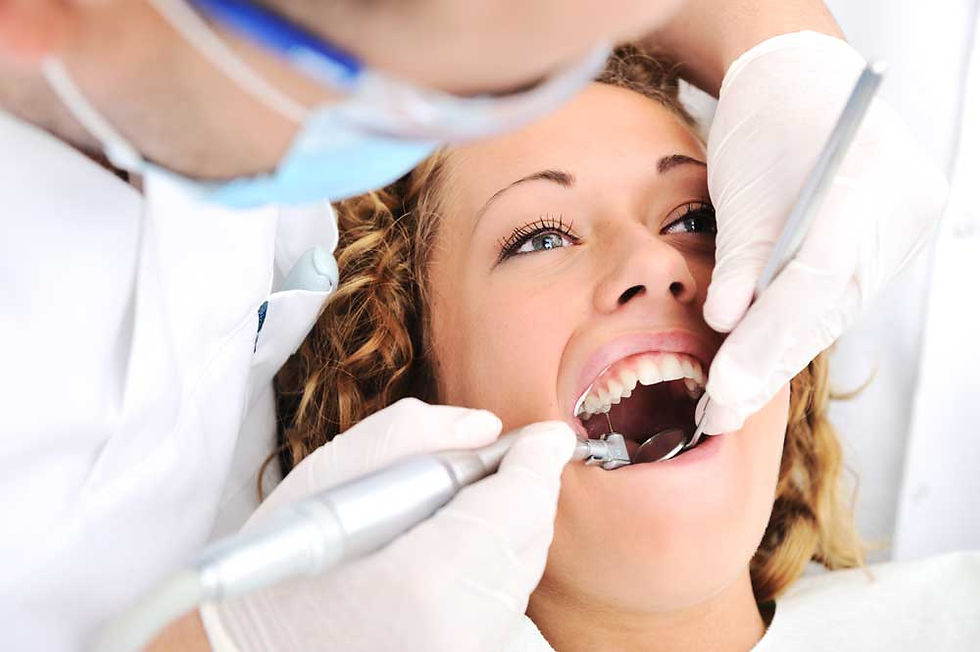What to expect when going to the dentist
- Laticia Gibson
- Mar 5, 2022
- 3 min read
How often should you go to the dentist? The short answer is that it depends on your dental and medical history, but the American Dental Association recommends annual visits after the age of 18, and even sooner if you have risk factors that may lead to problems such as tooth decay or gum disease. Whether you’re looking for advice on how to prepare before your first appointment or what to expect from your dentist during every visit, this guide has everything you need to know about going to the dentist in one place.
Why you should go to the dentist
Having a routine checkup is an essential part of maintaining your health. Making sure that you visit your dentist every six months can ensure that you don’t face any severe issues in your dental health. The best way to know if your oral hygiene is on point is if you are experiencing very few problems and if there are very little changes in appearance and health. Your dentist will be able to do a visual check, performing various tests as well as using x-rays to make sure everything is okay. But what happens if something does go wrong? It’s time for root canal recovery!
Don’t be afraid of the dentist
While you may be dreading your next dentist appointment, keep in mind that it’s not as bad as you think. In fact, depending on how long it’s been since your last checkup, a dentist visit can actually be enjoyable. Learn what to expect during your next trip to a dentist near me and leave with a positive experience instead of a painful one.
Why you need a cleaning before an extraction
Part of a dentist’s job is preventing issues that could become bigger problems down the road. One way they do that is by using their hands and tools to physically remove plaque and tartar from teeth. If you get regular cleanings every six months, your dentist can keep your mouth healthy and ward off smaller problems (like cavities). During cleanings, your dentist will also look for signs of tooth decay or oral cancer and recommend treatment as needed. A few weeks before a root canal, it’s important to schedule a cleaning appointment with your dental office so there aren’t any surprises during recovery. Typically, these appointments happen about one week before an extraction; however, some offices may be able to squeeze you in earlier depending on availability.
Is your tooth really rotten?
You’re in pain. You go to your dentist and they tell you you need a root canal. What do you do? Get it over with, right? Not necessarily! It’s important that all options are explored before moving forward. There could be an option for root canal recovery or there might not be. Best thing is to find out exactly what has happened so you can move forward from there. Best dentist appointment near me will give you more information on some of those details.
Toothache home remedies
If you’re in pain, a home remedy can help. Keep these at hand for quick relief from a toothache: flossing and rinsing with salt water or baking soda, clenching a warmed compress against your face to draw blood flow away from inflamed tissues and chewing on sugarless gum. These methods may be enough to last you until you see your dentist appointment near me. However, It’s always best to see your dentist as soon as possible so we can determine what steps need to be taken next in order to restore oral health back to normal.
How long does root canal recovery take?
During a root canal procedure, an abscess or infected nerve is extracted from your tooth and filled with a filling. It can take weeks for your gums to heal, however, and most dentists recommend that you avoid eating anything hot or cold for at least 48 hours after you get one done. During that time, any type of sudden temperature change can cause pain. Also, avoid spicy foods and alcohol during that period because they may irritate your mouth as well. The average dentist appointment near me should last between 45 minutes and an hour on average; it may last longer if you need a filling or other work done along with your root canal treatment. Bring any medications you're on—or will be starting soon—to your dentist appointment in case you experience complications afterward.


Comments